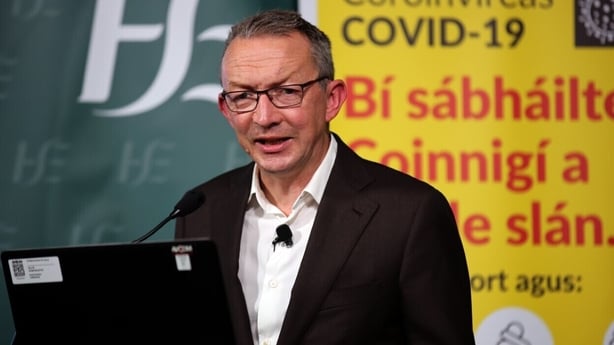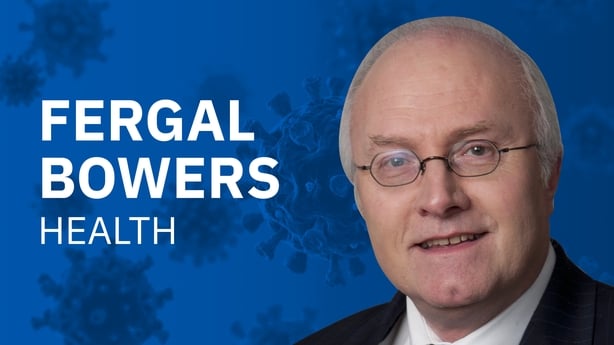The Health Service Executive has said its advice is that people over 70 should get the Pfizer-BioNTech and Moderna Covid-19 vaccines, rather than the AstraZeneca vaccine.
The first of the 400,000 doses of the AstraZeneca vaccine are due to arrive in Ireland next week.
They were expected to be used by GPs to begin vaccinating older people in mid-February, starting with those aged over 85.
It is easier to handle as it does not need to be kept in very cold conditions.
The AstraZeneca vaccine will now be reserved for younger people.
HSE Chief Clinical Officer Dr Colm Henry told RTÉ's News at One the view is that the Pfizer-BioNTech and Moderna vaccines afford greater protection for older people.
Dr Henry said that the Pfizer vaccine will be administered by GPs, but this will be more tricky as it needs to be stored as very low temperatures.
He said the advice is from the European Medicines Agency, via the National Immunisation Advisory Committee.
The NIAC has recommended that all authorised vaccines can be used in adults of all ages, including those over 70.
However, it said that mRNA vaccines, such as Pfizer BioNTech and Moderna, should be used for the over 70s where "practicable and timely".
In its review of the AstraZeneca vaccine, the committee advised that while there is a lack of efficacy data regarding the AstraZeneca vaccine in older adults, "there is nothing in the immunogenicity data indicating that it will be less effective than in the younger population".

While the NIAC decided this week that the AstraZeneca was an option for older people, Dr Henry said the advice is that the mRNA vaccines are preferred for older age groups.
The Taoiseach has said the decision to prioritise the Pfizer-BioNTech and Moderna Covid-19 vaccines for people aged over 70 will "create significant challenges" for the HSE.
Micheál Martin said the National Immunisation Advisory Committee has advised the Chief Medical Officer Dr Tony Holohan that all three of the authorised vaccines are safe and effective.
However he said "for the over 70s, given the data that's currently available, the CMO is recommending that we would use the Pfizer BioNTech and Moderna vaccines, the so called mRNA vaccines, given that the objective is to reduce mortality and morbidity and that they are the most vulnerable age group, and that they would be most effective for them."
The Taoiseach told RTÉ News that the AstraZeneca vaccine will be used for cohorts four, five, six and seven on the vaccination priority list, which he said "will bring those somewhat forward".
He said "there will be logistical challenges because this changes the model that the Health Service Executive and the Task Force were working on."
"It does create significant challenges now for the HSE as it changes the plan, because the Pfizer BioNTech and Moderna vaccines need to be kept in very cold refrigeration temperatures," he said.
The Taoiseach said that "would be problematic but nonetheless they are working on that now to get that right".
The Taoiseach has said the decision to prioritise the Pfizer-BioNTech and Moderna Covid-19 vaccines for people aged over 70 will "create significant challenges" for the HSE | https://t.co/h4YlvTcqv7 pic.twitter.com/aAfftNSz1x
— RTÉ News (@rtenews) February 3, 2021
Latest coronavirus stories
Switzerland seeks more data on Oxford-AstraZeneca vaccine
In a statement from the Department of Health, Dr Holohan said: "Due to the demonstrated efficacy of mRNA vaccines in older persons and in recognition of their particular vulnerability in terms of their increased risk of death and serious disease if they contract Covid-19, it has been recommended that mRNA vaccines be administered to all those over 70 years in order to provide the highest level of protection available to this population."
NIAC said that there is an urgency to protect those aged 70 and older who are a most risk and that the best vaccine anyone can receive at this time is the vaccine that can be soonest administered.
It has "strongly urged" everyone to accept whichever vaccine is available.
"Vaccination of those aged 70 and older should not be delayed. Where practicable and timely, those aged 70 and older should be given an mRNA vaccine," it said.
We need your consent to load this rte-player contentWe use rte-player to manage extra content that can set cookies on your device and collect data about your activity. Please review their details and accept them to load the content.Manage Preferences
NIAC said that for those aged 65 and older, a two-dose schedule of Covid-19 AstraZeneca administered at an interval of four to six weeks is recommended.
For those younger than 65 years of age, a two-dose schedule of the vaccine administered at an interval of four to 12 weeks is recommended.
Recently, health authorities in a number of European countries decided not to use the AstraZeneca vaccine in those over 65 due to concerns about efficacy data.
Dr Henry said that the approach may change over time if more evidence emerges on the AstraZeneca vaccine, in particular its use in the UK.
Oxford Vaccine Group director Andrew Pollard has said that more data on older people should be available within weeks with the completion of a US trial and early results from Britain's vaccination drive.
The Chief Clinical Officer said that GPs are "key vaccinators, key parts of this programme" and are best placed to encourage uptake of vaccines.
They "are key advocates for older people" who are most vulnerable to the virus, Dr Henry added.
The advice 'generally' is to give the Pfizer and Moderna vaccines to older people, @CcoHse Dr Colm Henry has said.
— RTÉ News (@rtenews) February 3, 2021
He said this will begin in mid-February, with the AstraZeneca vaccine doses to be given to other cohorts | Read more Covid-19 coverage: https://t.co/TfuwyqlCvJ pic.twitter.com/gpfF778fUs
He also described the vaccination take up as "unprecedented", not just in nursing homes, but in all healthcare settings and among the general public.
Dr Henry said that of 580 nursing homes, 117 are incomplete in terms of vaccination. He said that 10-40% of staff or residents have not been vaccinated because they were not present at work, were sick with Covid-19 or were recovering from the virus.
He said that teams could not enter four nursing homes due to public health advice based on the nature of the outbreaks.
Dr Henry said they will get back to these people but it will take a longer time, as they have to allow a four-week gap because of the illness before they can vaccinate again.
He said those in "the great bulk of nursing homes" were vaccinated by 25 January, but since then, those in additional facilities - not in the strict definition of residential care facilities, but where older people congregate and are at a particular risk - are being vaccinated.
He said he expects the second round of vaccination will be completed in the first week in March.
There has been 'unprecedented' uptake of the Covid-19 vaccination programme so far, HSE Chief Clinical Officer Dr Colm Henry has said | Read more Covid-19 coverage: https://t.co/TfuwyqlCvJ pic.twitter.com/Zev6N7GY7o
— RTÉ News (@rtenews) February 3, 2021

With today's recommendations, the national vaccination programme against Covid-19 has now become more complex for the HSE, doctors, patients and Government.
And it raises questions for people about what exactly happens next.
The recommendations might affect the priority schedule for roll out for various groups and how soon those over 85 and the lower of the older age groups receive vaccination.
But the National Immunisation Advisory Committee says that the best vaccine anyone can receive at this time is the vaccine that can be administered fastest.
Certainly no-one wants to see any delay in vaccinating people aged 70 and older given the risks posed by the virus.
Some doctors may see an ethical issue arising in administering a vaccine, if they believe a potentially more effective one is available.
It will all further test the vaccination programme, already affected by vaccine delivery delays and moving targets.







